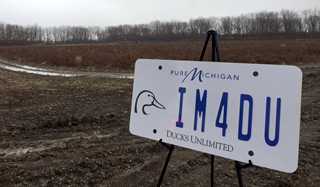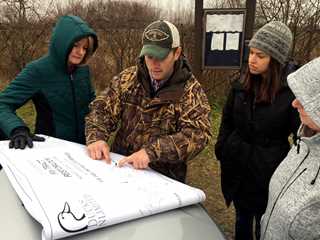License plate sales fund Michigan wetlands project
Sales from DU license plates enable vital wetlands project near birthplace of automobile industry
Sales from DU license plates enable vital wetlands project near birthplace of automobile industry
Detroit, and much of southeast Michigan, has been a sprawling bustle of human activity since the Industrial Revolution and the rise of the automobile.
Population and development grew during the 20th Century, but one of the byproducts of that growth was the destruction of wetland habitat along the Detroit River. The entire river and western shore of Lake Erie, including the 6,000-acre Detroit River International Wildlife Refuge, is a major migration route for waterfowl.
Since the 1800s, this region has lost 97 percent of its coastal wetlands. These historic wetlands, valuable for ducks, flood control and water quality, have been replaced with houses, factories and farm fields. Ducks Unlimited for nearly 30 years has chipped away at wetland losses, completing numerous projects in the region.
Fittingly, Ducks Unlimited is partially funding a project near Detroit with ties to the same automobile culture that shaped the region.
Ducks Unlimited is using $30,000 from Michigan DU license plate sales to pay for the 53-acre Fix Unit Restoration project in Monroe County. Formerly used for farming, the land is part of a coastal wetland complex along the Lake Erie coast in southeast Michigan, including Pointe Mouillee State Game Area, Ford Marsh and Sterling State Park.
The $200,000 project features significant waterfowl migration benefits for several species of waterfowl and nesting habitat for mallards, wood ducks and Canada Geese. It improves habitat for hundreds of other wildlife species. The property is open to public hunting.

Michigans Ducks Unlimited license plate program is a tremendous funding tool for DU and the conservation of wetlands. Since 2014, DU has sold or renewed more than 2,000 license plates which has generated about $50,000 for conservation. The Fix Unit Restoration is the first opportunity to steer these dollars into restored habitat. The effort was led by the D.U. Monroe Chapter volunteers and Michigan Sens. Dale Zorn and Randy Richardville.
The project site is owned and managed by the U.S. Fish and Wildlife Service Detroit River International Wildlife Refuge. Another reminder of the scarcity of wetlands in this region, the Fix project is adjacent to the towering stacks of DTE Energys Fermi II nuclear power plant.
Ducks Unlimited this winter will finish the Fix restoration project, which includes about 30 acres of coastal emergent wetland restoration and 23 acres of lakeplain prairie restoration. DU is creating berms and installing infrastructure which will allow the U.S Fish and Wildlife Service to control water levels and create ideal wetland and grassland habitat.

"We appreciate our Ducks Unlimited volunteers and members promoting DU license plate sales," said Jason Hill, Ducks Unlimited biologist and manager of DUs Great Lakes Conservation Initiative. "All those plates gave us the means to restore critical waterfowl habitat here in southeast Michigan."
In addition to license plate sales, project funding is provided by Ducks Unlimited via a North American Wetland Conservation Act grant from the Saginaw Bay to Lake Erie Coastal Habitat Initiative. This is a broad coalition that has conserved thousands of acres of wetlands from Saginaw Bay to the coast of Lake Erie.
Ducks Unlimited uses cookies to enhance your browsing experience, optimize site functionality, analyze traffic, and deliver personalized advertising through third parties. By continuing to use this site, you agree to our use of cookies. View Privacy Policy